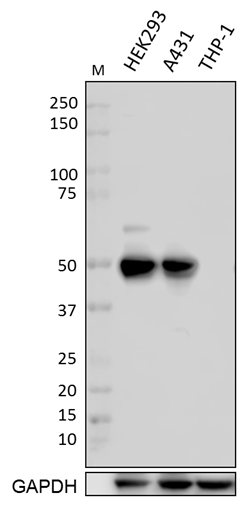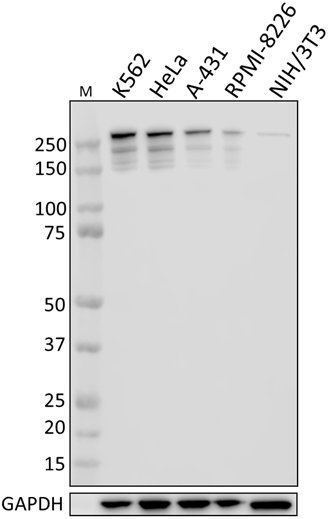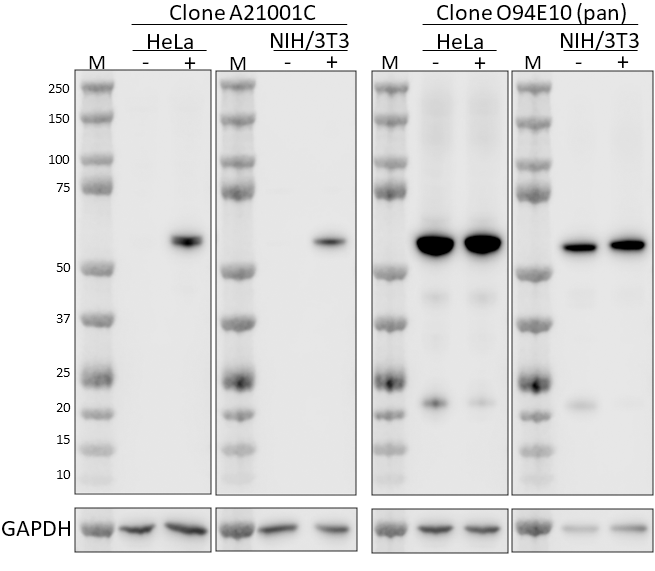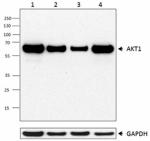- Clone
- O94E10 (See other available formats)
- Regulatory Status
- RUO
- Other Names
- V-Akt Murine Thymoma Viral Oncogene Homolog 1, Protein Kinase B alpha, Rac Protein Kinase alpha, RAC-PK-alpha, PKB alpha, PRKBA, AKT, PKB, RAC, CWS6, PKB-ALPHA, RAC-ALPHA
- Isotype
- Mouse IgG1, κ
- Ave. Rating
- Submit a Review
- Product Citations
- publications

-

Total lysates (10µg protein) from HeLa and HeLa AKT1 CRISPR/Cas9 knockout (KO) cells were resolved by electrophoresis (4-20% Tris-glycine gel), transferred to nitrocellulose, and probed with 1:1000 (0.5µg/ml) purified anti- AKT1 antibody, clone O94E10 (upper). Proteins were visualized using chemiluminescence detection by incubation with HRP goat anti-mouse-IgG secondary antibody (cat#405306). Direct-Blot™ HRP anti-β-actin Antibody (Cat#643807) was used as a loading control (lower). Lane M is the Molecular weight ladder. -

Western blot analysis of cell lysates from Jurkat (lane 1), HT29 (lane 2), HeLa (lane 3) and NIH3T3 (lane 4). Purified anti-AKT1 antibody (clone O94E10 ) was used and then followed by HRP anti-mouse IgG antibody. GAPDH antibody (clone poly6314) was used as a loading control.
AKT (Protein kinase B, PKB) is a serine/threonine kinase that plays a key role in regulating cell proliferation, survival, and metabolism. Dysregulation of AKT can lead to diseases such as cancer, diabetes, along with cardiovascular and neurological diseases. There are three isoforms of AKT- AKT1, 2, and 3 (also known as PKBα, β, and γ). AKT are activated by growth factors and other extracellular stimuli as well as by oncogenic mutations in key upstream regulatory proteins, which include Ras, PI3-kinase subunits, and PTEN. Increasing evidence suggests that AKT1, 2, and 3 plays a unique role in breast cancer initiation and progression. AKT1 is cardioprotective to the heart by supporting its physiological growth and function. A reduced level of AKT1 in the frontal cortex has been found during post-mortem brain studies of schizophrenic patients in the populations of many countries.
Product DetailsProduct Details
- Verified Reactivity
- Human, Mouse
- Antibody Type
- Monoclonal
- Host Species
- Mouse
- Immunogen
- Full length recombinant protein of human AKT1 expressed in HEK293T cells.
- Formulation
- Phosphate-buffered solution, pH 7.2, containing 0.09% sodium azide.
- Preparation
- The antibody was purified by affinity chromatography.
- Concentration
- 0.5 mg/ml
- Storage & Handling
- The antibody solution should be stored undiluted between 2°C and 8°C.
- Application
-
WB - Quality tested
KO/KD-WB - Verified - Recommended Usage
-
Each lot of this antibody is quality control tested by Western blotting. For Western blotting, the suggested use of this reagent is 0.5 - 2.0 µg per ml. It is recommended that the reagent be titrated for optimal performance for each application.
- Product Citations
-
- RRID
-
AB_2566355 (BioLegend Cat. No. 680302)
Antigen Details
- Structure
- 480 amino acids with a predicted molecular weight of approximately 56 kD.
- Distribution
-
Cytoplasm, nucleus, cell membrane, phosphorylation on Tyr-176 by TNK52 results in its localization to the cell membrane where it is targeted for further phosphorylations on Thr-308 and Ser-473 leading to its activation and the activated form translocates to the nucleus.
- Function
- AKT1 plays a key role in regulating cell proliferation, survival, and metabolism.
- Interaction
- BTBD10, KCTD20, CCDC88A, GRB10, AGAP2, AKTIP, MTCP1, TCL1A , TCL1B, CDKN1B, MAP3K5, BAD, PPP2R5B, STK3, STK4, SIRT1, SRPK2, RAF1, TRIM13, TNK2, CLK2, THEM4 , PDPK1 PA2G4, and KIF14.
- Biology Area
- Angiogenesis, Apoptosis/Tumor Suppressors/Cell Death, Cell Biology, Cell Cycle/DNA Replication, Cell Motility/Cytoskeleton/Structure, Neuroscience, Signal Transduction, Ubiquitin/Protein Degradation
- Molecular Family
- Protein Kinases/Phosphatase
- Antigen References
-
1. Perira L, et al. 2015. Drug Discov. Today 9:1152-8.
2. Yu H, et al. 2015. Vascul. Pharmacol. 71:57-64.
3. Cohen MM Jr. 2013. Am. J. Med. Genet. A. 12:2931-7.
4. Dillon RL, Muller WJ. 2010. Cancer Res. 11:4260-4.
5. Song G, et al. 2005. J. Cell Mol. Med. 1:59-71.
6. Hers I, et al. 2011. Cell Signal. 23:1515. - Gene ID
- 207 View all products for this Gene ID
- UniProt
- View information about AKT1 on UniProt.org
Related FAQs
Other Formats
View All AKT1 Reagents Request Custom Conjugation| Description | Clone | Applications |
|---|---|---|
| Purified anti-AKT1 | O94E10 | WB,KO/KD-WB |
Customers Also Purchased


Compare Data Across All Formats
This data display is provided for general comparisons between formats.
Your actual data may vary due to variations in samples, target cells, instruments and their settings, staining conditions, and other factors.
If you need assistance with selecting the best format contact our expert technical support team.





_Antibody_1_WB_062116.jpg)





Follow Us